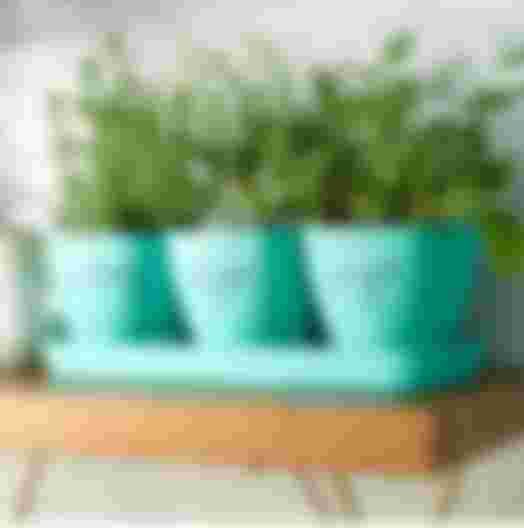You don't need to have a massive plot of land or a green thumb to start a fresh herb garden. Lack of yard space is not a problem! All you have to do is discover and learn how to create an indoor herbs garden with receptacles, which I assume is not hard at all. An indoor herb garden's ideal setting is your kitchen, where you can snip fresh herbs and use them right away on your dishes. You can still grow herbs at any part of your house or in a sunny room if you don't have a spot in your kitchen. Let's discover what herbs to grow indoors, how to grow herbs indoors and tips on how to take care of your indoor herb garden.
Find The Sunniest Spot For Indoor Herb Garden
Most herbs are true sun-lovers; thus, natural light is essential to them. It only says that you need to look for a spot in your house to provide your herbs with at least six hours of sunlight for them to grow. You can place them in the brightest spot near the window to maximize their exposure to sunlight. It is also important to keep indoor herbs looking great in your kitchen garden. So when the other part of the plants can't receive enough light, rotate the pot to get enough light on its other side. It helps correct a bent growth of a plant. When your herbs are not getting enough light, this may lead to low growth, leggy stem, and leaves' discoloration. Alternatively, you can use grow light to ensure your indoor herbs are getting enough light. It is also a great solution to provide extra light during winter.

Pick The Right Plants and Pots
Growing herbs indoors is easy. Many herbs can grow in your kitchen garden, these include Basil, chives, mint, oregano, parsley, rosemary, and thyme. You can get started by cutting stems or sprinkle a small number of seeds. Make sure to use nutrient-rich soil for your indoor herbs. Choosing the correct pot or containers also needs to be considered and as long as it has drainage. Be sure to use a drain pan under the pot to protect your surface. Use the container's particular size provided the plant fits, but understand that the shorter the vessel, the sooner you'll have to transfer it into another pot. And In the bottom, make sure to put a bed of pebbles to catch excess moisture.

Temperature For Indoor Herbs
Herbs are the happiest when they are at a typical indoor temperature. One of the important factors in the successful growing of indoor herbs is the correct temperature. Ideally, a temperature that works well in the environment is between 60-70 degrees. Usually, temperatures near a window spot may drop to 55 degrees at night time, but most herbs love that, too. Make sure the foliage is not touching the glass to shield them from getting pinched by a cold. The most different herbs which are sensitive to temperature is the Basil. Many herb-lovers want to have Basil in their indoor garden, but make sure to have a spot near the sunny window so Basil can thrive; when it is set in the cool place, the leaves will drop and get pale after a short time. Basil prefers indoor temperatures of 70 degrees.
Watering The Herbs
When the soil is dry from the top, then it's time to water your indoor herbs. Water is another essential element in a plant's life. The nutrients and moisture are passed directly to plant roots. Water serves several major physiological ideas for a plant's survival, which include growth and metabolism. Also, Slow watering is best for indoor herbs. It is very tricky because the water may run straight to pot and out on the drainage holes when you water too quickly.
Air Circulation is Vital
It is an excellent idea to rearrange your indoor plants occasionally. Stagnant air is not suitable for your indoor plants. Sufficient air circulation is vital to herbs to blocks the spread of diseases and secures your plants from contamination. It is also useful for wicking away the damp and making those plants healthier and happier. They need space to give them a room to breathe.
Show Indoor Herbs Some Love
Having some quality time with your plants helps them produce food. Yes, that's right! While you are talking to them, you release the carbon dioxide needed by the plant. The leaves become stronger when you gently brush them with your palm.
Everything is set; you don't need to worry. Always have in mind to water regularly and fertilize the herbs if necessary. Now I'm pretty sure that you know how to grow herbs indoors. Be excited cause you will be rewarded with the delightful herbs the whole year!

